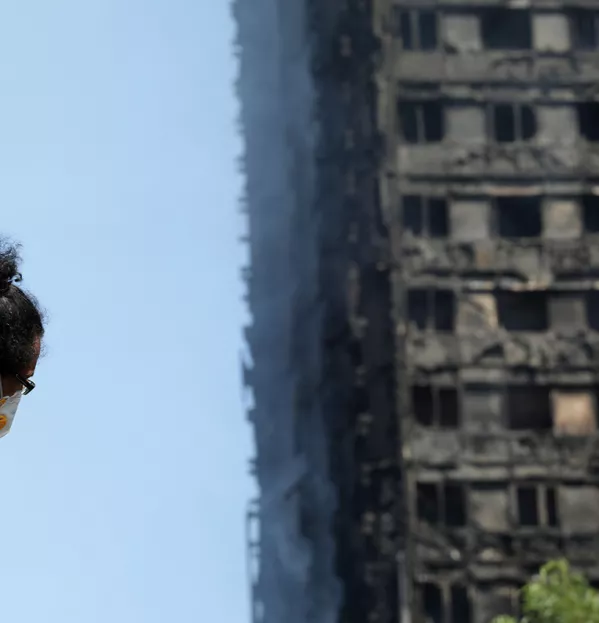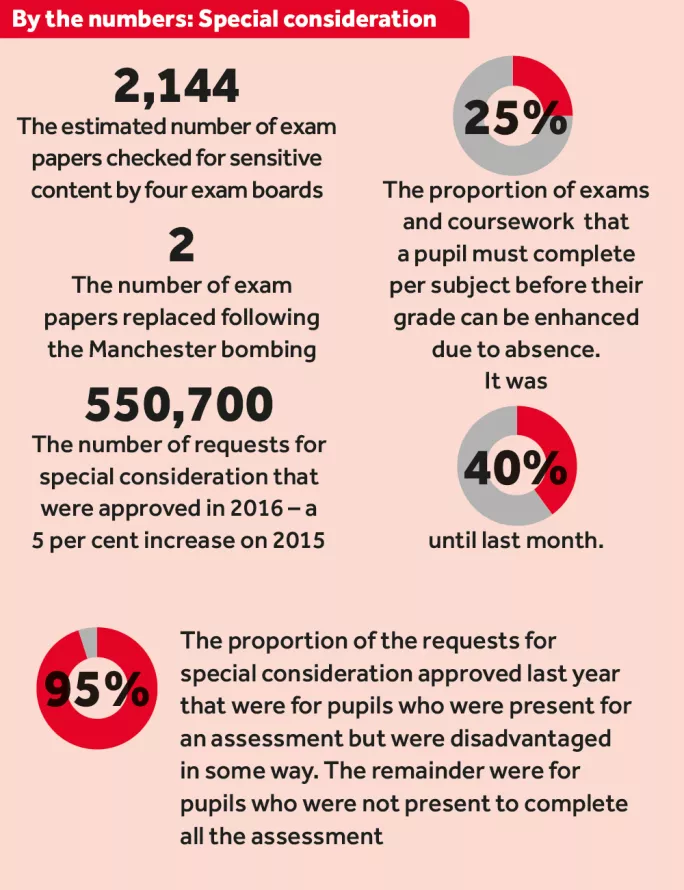Desperate times: the untold story of exam season 2017

Exam season is often a hugely stressful time for pupils, teacher and heads - but this year schools also had to cope with three seismic events that happened within just 23 days of each other: the Manchester Arena bombing, the London Bridge attack and the Grenfell Tower fire.
This tragic series of incidents prompted exam boards to abandon their normal procedures in an attempt to avoid harming pupils sitting their GCSE, AS and A-level exams, it has emerged.
During the second week of exams, thousands of young people were leaving pop star Ariana Grande’s concert in Manchester when a suicide bomber detonated. Eight of the 22 people killed were aged 18 or under.
The exam timetable remained unchanged, but local schools were able to delay the start of exams by an hour, in case pupils faced transport difficulties. The same rules applied after the major events in London.
On the surface, apart from this flexibility around start times, it appeared to be business as usual in the exam season. But Tes has learned that, behind the scenes, exam boards took the unprecedented step of poring over more than 2,000 exam papers after the bombing to check for sensitive content - and at least two exam papers had to be changed at the last minute.
It has also come to light that, following the “tragic events” this summer, the Joint Council for Qualifications has decided to significantly lower the threshold for deciding which pupils can have “special consideration” for their circumstances when it comes to awarding grades.
Schools are able to apply for special consideration either for pupils who were absent from an assessment due to circumstances beyond their control, or for those whose performance may have been affected. Pupils were previously required to have sat at least 40 per cent of an assessment before an exam board would consider whether to enhance a grade - but now this has been lowered to 25 per cent.
A new reality?
Is the impact of terrorism on exams a new reality that the system has to face up to? And have schools and exam boards been given enough resources to cope with the consequences of such incidents?
Exam boards have worked with schools affected by major incidents in the past to ensure that pupils were not disadvantaged by events outside their control. For example, after the 2015 floods in Cumbria.
But Tes understands that this year is the first time that the three major exam boards - AQA, OCR and Edexcel - have combed through all the exam papers to look for sensitive content following an incident.
After the Manchester bombing on 22 May, 2,144 exam papers that hadn’t yet been taken were checked by the four biggest exam boards in England and Wales.
Two exam papers - an AQA GCSE religious studies paper and an Edexcel general studies paper - had to be changed. The Edexcel paper referred directly to terrorism and was felt to be “an unnecessary distraction” given “the circumstances”, says a spokesperson.
Meanwhile, AQA contacted schools about an AS-level French paper that included a reference to Ariana Grande, and an A-level French paper that mentioned terrorism in source material - so they could decide whether to warn pupils before the exam.
“The events of the summer shocked everyone, so we all felt that it was our duty to make sure that our exams didn’t add to anyone’s distress,” says Philip Bridgehouse, customer engagement manager at AQA.
“It was a massive task to review all our exam papers in a short time, but it was a really important thing to do.”
More pressure
The Welsh WJEC Eduqas exam board removed a reference to Islamic State in source materials for a media studies GCSE paper.
Michael Turner, director general of the Joint Council for Qualifications, which represents the UK’s seven largest exam boards, says: “The question papers are written nearly a year in advance and changing questions is not something they are going to do lightly.”
It is not known at this stage how many schools have made requests for special considerations. The incidents happened at a time when the exam boards were in hot water after a series of widely publicised exam paper errors and alleged leaks. And the first exams in the new GCSEs in maths and English - as well as 13 new linear A levels - are said to have placed even more pressure on the system.
Geoff Barton, general secretary of the Association of School and College Leaders, says that while the mistakes will have “irritated” headteachers, the tragedies resulted in everyone coming together. But he admits that schools could never really have been prepared for this summer’s events.
Patsy Kane, executive head of Whalley Range High and Levenshulme High School, two schools in Manchester, agrees. “We all have business continuity plans and you assess risk, but I don’t think any of us anticipated that concert event,” she says.
Additional counselling support was provided by the local authority for pupils and staff. “There were really major exams happening that week and it felt like the most difficult situation and atmosphere to be in compared to any other normal year,” adds Kane.

You need a Tes subscription to read this article
Subscribe now to read this article and get other subscriber-only content:
- Unlimited access to all Tes magazine content
- Exclusive subscriber-only stories
- Award-winning email newsletters
Already a subscriber? Log in
You need a subscription to read this article
Subscribe now to read this article and get other subscriber-only content, including:
- Unlimited access to all Tes magazine content
- Exclusive subscriber-only stories
- Award-winning email newsletters